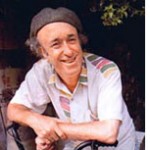By Dan Bloom

CHIAYI CITY, Taiwan — When Pope Francis visited the United States at virtually every stop and public speech and in private visits with President Obama and elementary school schoolchildren, he asked people to “pray for me.” As a non-Catholic and a frequent columnist for San Diego Jewish World, I was curious (in my ignorance) why the Pope would be asking people to pray for him, rather to pray for the homeless or the sick or the war-torn refugees of Syria, for example.
Having no answer, I informally asked an editor friend who works for an ecumenical Christian religious news service, called Religion News Service (RNS) in Washington, D.C. if she knew the answer. She tweeted back to me” “Good question.”
A week later, lo and behold, by the grace of God, the RNS wire service ran a news article by freelance religion writer Christine Scheller that tried to answer my question. When it was published under the headline “Why is Pope Francis asking people to pray for him?” both the editor who assigned the story and the reporter who wrote it sent me a new tweet that said: “Thanks for the question. Here’s the answer.”
So what did I learn from the RNS report? Among other things, according to the article the Pope repeated the same prayer request refrain at every stop from Washington to New York to Philadelphia. He even reportedly asked President Obama in private to ”pray for me.”
And as he concluded his first U.S. tour with an open-air Mass in Philadelphia he told the largely Catholic congregation: “I ask you to pray for me. Don’t forget!”
Scheller got right to the point in her RNS article, writing: “It’s a simple enough request. But for a pope? Isn’t it supposed to be the other way around — the pope praying for Catholics?”
She went to her sources and quoted the Rev. Claudio Burgleta, a professor of theology at Fordham University’s Graduate School of Religion and Religious Education, as telling her that two things were at work in the Pope’s refrain: ”a classic Christian understanding of prayer and Pope Francis’ particular understanding of the office of bishop.”
According to Burgleta, one of Jesus’ apostles exhorted the early church to pray for leaders. And prayers for the pope and bishops are said every time communion is celebrated, he added.
Thomas Groome, director of the Church in the 21st Century Center at Boston College’s School of Theology and Ministry, told RNS that there was another side to this story, too.
“What’s disarming about this pope asking for prayers is that Catholics don’t think of the pope as needing prayers,” Groome said. “The pope intercedes for us before God, whereas him asking us to intercede for him is kind of putting the shoe on the other foot.”
Francis is insisting on his solidarity with the whole human family in his need for prayers, Groome added, noting: “Popes are big, powerful leaders. But this man leads out of humility and compassion and mercy, which may be a more effective way to lead, at least on the world stage.”
RNS uncovered an important detail in its quest to answer this Jewish reporter’s question.
Apparently, during an airplane flight from Rio de Janeiro to back to Italy in 2013, the Pope tried to explained his “pray for me” refrain to reporters on board telling them that
he had always asked people to pray for him, but more so after he had become a bishop.
“I feel I have many weaknesses and problems; I am a sinner too.” he said.”
This request is something that comes from within. I also ask Mary to pray for me. It’s a habit that comes from the heart. It’s something I feel I have to ask.”
But there’s more to this than meets the eye, I found out. The Pope is also using his “pray for me” mantra as a proselytizing tool, especially for young people.
In an article headlined “Pope Francis leaves students in East Harlem with some homework, CNN reported that he had an important “homework” assignment for them.
“Can I do that? ” he asked the students. “It is a simple request, but very important. Please
don’t forget to pray for me, so that I can share with many people the joy of Jesus. Let us also pray so that many people can share the joy like yours.”
So when the Pope says “pray for me” he is doing many things: creating a new tradition, following in the footsteps of older traditions, showing himself to be a humble man of God, and, as befits his station in life, doing a bit of proselytizing for the Gospel of Jesus Christ at the same time.
The RNS story did not mention the East Harlem school homework story, but it’s true, too. It’s the Pope’s job to stand up for his Catholic beliefs, even as he admires and respects the equally-important religions of Judaism, Islam, Buddhism and Shinto, among other world belief systems, none of which are superior to any other.
In other words, ”we are the world.” Long live Pope Francis!
*
Bloom is a freelance writer based in Taiwan. He may be contacted via dan.bloom@sdjewishworld.com
[FEEDBACK COMING IN VIA EMAIL]: ”Dear Mr Bloom, I am Jewish and my wife of 43 years is Roman Catholic. We have melded together all these years. I liked your article very much and will show it to her and to her mother, aged 90.”
— Raymond Schwartz, San Diego